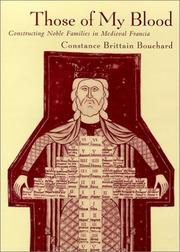| Listing 1 - 2 of 2 |
Sort by
|

ISBN: 0812235908 9780812235906 9786613211484 1283211483 081220140X 0585436193 Year: 2001 Publisher: Philadelphia : ©2001 University of Pennsylvania Press,
Abstract | Keywords | Export | Availability | Bookmark
 Loading...
Loading...Choose an application
- Reference Manager
- EndNote
- RefWorks (Direct export to RefWorks)
For those who ruled medieval society, the family was the crucial social unit, made up of those from whom property and authority were inherited and those to whom it passed. One's kin could be one's closest political and military allies or one's fiercest enemies. While the general term used to describe family members was consanguinei mei, "those of my blood," not all of those relations-parents, siblings, children, distant cousins, maternal relatives, paternal ancestors, and so on-counted as true family in any given time, place, or circumstance. In the early and high Middle Ages, the "family" was a very different group than it is in modern society, and the ways in which medieval men and women conceptualized and structured the family unit changed markedly over time. Focusing on the Frankish realm between the eighth and twelfth centuries, Constance Brittain Bouchard outlines the operative definitions of "family" in this period when there existed various and flexible ways by which individuals were or were not incorporated into the family group. Even in medieval patriarchal society, women of the aristocracy, who were considered outsiders by their husbands and their husbands' siblings and elders, were never completely marginalized and paradoxically represented the very essence of "family" to their male children. Bouchard also engages in the ongoing scholarly debate about the nobility around the year 1000, arguing that there was no clear point of transition from amorphous family units to agnatically structured kindred. Instead, she points out that great noble families always privileged the male line of descent, even if most did not establish father-son inheritance until the eleventh or twelfth century. Those of My Blood clarifies the complex meanings of medieval family structure and family consciousness and shows the many ways in which negotiations of power within the noble family can help explain early medieval politics.
Nobility --- Knights and knighthood --- History --- 929.7 --- Adel. Eretitels --- 929.7 Adel. Eretitels --- Knighthood --- Civilization, Medieval --- Chivalry --- Heraldry --- Orders of knighthood and chivalry --- Noble class --- Noble families --- Nobles (Social class) --- Peerage --- Upper class --- Aristocracy (Social class) --- Titles of honor and nobility --- Nobility - France - History - To 1500. --- Nobility - France - Genealogy. --- Knights and knighthood - France - History - To 1500. --- History. --- Medieval and Renaissance Studies.
Book
ISBN: 9781107042216 1107042216 9781107325111 1107325110 9781461950844 1461950848 9781107506640 1107506646 110750287X 1139893513 110750127X 1107517044 1107497337 1107503965 1316631125 9781316631126 9781107501270 9781107502871 9781107503960 9781107517042 9781139893510 9781107497337 Year: 2013 Publisher: Cambridge
Abstract | Keywords | Export | Availability | Bookmark
 Loading...
Loading...Choose an application
- Reference Manager
- EndNote
- RefWorks (Direct export to RefWorks)
Craig Taylor's study examines the wide-ranging French debates on the martial ideals of chivalry and knighthood during the period of the Hundred Years War (1337-1453). Faced by stunning military disasters and the collapse of public order, writers and intellectuals carefully scrutinized the martial qualities expected of knights and soldiers. They questioned when knights and men-at-arms could legitimately resort to violence, the true nature of courage, the importance of mercy, and the role of books and scholarly learning in the very practical world of military men. Contributors to these discussions included some of the most famous French medieval writers, led by Jean Froissart, Geoffroi de Charny, Philippe de Mézières, Honorat Bovet, Christine de Pizan, Alain Chartier and Antoine de La Sale. This interdisciplinary study sets their discussions in context, challenging modern, romantic assumptions about chivalry and investigating the historical reality of debates about knighthood and warfare in late medieval France.
Chivalry --- Chivalry in literature --- Knights and knighthood --- Hundred Years' War, 1339-1453. --- War and society --- Chevalerie --- Chevalerie dans la littérature --- Chevaliers et chevalerie --- Guerre de Cent Ans, 1339-1453 --- Guerre et société --- Philosophy --- History --- Philosophie --- Histoire --- Knights and knighthood in literature --- Hundred Years' War, 1339-1453 --- Chevaliers --- Guerre de Cent ans (1337-1453). --- Philosophy. --- Dans la littérature. --- Ritter --- Frankreich --- Ritter. --- Frankreich. --- --Philosophie --- --France --- --Moyen âge, --- Chevalier --- --Littérature --- --Guerre de Cent ans, --- Guerre --- --Société --- --Philosophy --- Chevalerie dans la littérature --- Guerre et société --- Knighthood --- Civilization, Medieval --- Nobility --- Heraldry --- Orders of knighthood and chivalry --- Manners and customs --- Courtly love --- Crusades --- Feudalism --- Society and war --- War --- Sociology --- Civilians in war --- Sociology, Military --- Social aspects --- Guerre de Cent Ans (1337-1453) --- Arts and Humanities --- Chivalry - Philosophy --- Chivalry - France - History - To 1500 --- Chivalry in literature - History - To 1500 --- Knights and knighthood - France - History - To 1500 --- Knights and knighthood in literature - History - To 1500 --- War and society - France - History - To 1500 --- Moyen âge, 476-1492 --- Littérature --- Guerre de Cent ans, 1337-1453 --- Société --- France --- Dans la littérature.
| Listing 1 - 2 of 2 |
Sort by
|

 Search
Search Feedback
Feedback About UniCat
About UniCat  Help
Help News
News